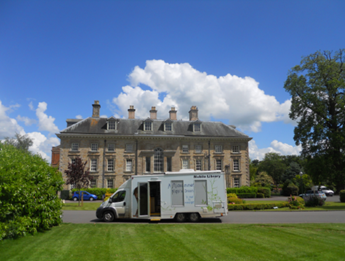T: 01822 851370 E: [email protected]
Visit RSN Survey about life in rural England to find out more.
The Essential Lifeline of Libraries in Rural Communities

Last week, coinciding with World Book Day - a global celebration of literature and reading - Rural Services Network Chief Executive, Kerry Booth took part in a Libraries Connected webinar, discussing the indispensable role of libraries in supporting the fabric of rural life. This event, featuring insights from Kerry Booth and Krystal Vittles, Deputy CEO of Suffolk Libraries, delved into the challenges and opportunities that rural libraries face, inspired by the vision laid out in the Defra policy document "Unleashing Rural Opportunity."
Our rural landscapes are home to over 9.7 million people, a testament to the vibrancy and resilience of these communities. However, the idyllic scenery belies the challenges they face—underfunded councils, higher living costs, and limited access to essential services. Libraries, in this context, are not mere repositories of books but pivotal community hubs that foster education, culture, and digital inclusivity. They serve as beacons of hope and innovation, navigating the complexities of underfunding and digital inequity with admirable resilience and adaptability.
The discussion highlighted the critical role libraries play in bridging the digital divide, offering essential internet access, digital literacy training, and support for remote learning and work. Additionally, libraries are celebrated as venues for social interaction, combating the isolation that can prevail in less densely populated areas. They are at the heart of rural communities' efforts to thrive, providing a wide array of services from health advice to information on net zero energy efficiency.
Empowering Communities through Innovation
Amid financial constraints and geographical challenges, the adaptability, innovation, and community solidarity displayed by rural libraries are truly motivating. Examples of libraries being utilised to their full potential include initiatives like Cambridgeshire Skills' weekly 'Guidance Club' at Ely Library, where attendees can enjoy a cup of coffee while getting information on local job vacancies and training. It's also a place where they can get help with CV writing or brush up on their interview skills, exploring different career options in a supportive environment.
 |
Suffolk Libraries exemplifies the transformative potential of libraries in addressing mental health and wellbeing within the community. Distinguished as one of the few library services in the UK to offer a dedicated mental health and wellbeing service, Suffolk Libraries actively supports both staff and patrons through comprehensive access to current and trustworthy mental health information and resources. This initiative extends beyond simple access to information; it includes providing mental health and wellbeing training opportunities for library staff. Such training enhances staff awareness and equips them to offer more effective support to library users.
Suffolk Libraries’ commitment to health and wellbeing is demonstrated through its collaborative approach with local services and organisations across Suffolk. These partnerships ensure that libraries remain closely connected with available local resources, enriching the community's access to mental health support. This collaborative effort opens avenues for other services to engage with and contribute to the collective wellbeing of the community.
 Photo Credit: Warwickshire County Council |
In an exciting development for library services in Warwickshire, Warwickshire County Council has announced the introduction of two new, fully electric mobile library vehicles. These contemporary, eye-catching vehicles promise to maintain the trusted service levels while introducing meaningful improvements in environmental sustainability and accessibility. Each vehicle is equipped with a lift, ensuring all customers, regardless of mobility, can access the wide range of resources offered, including a selection of books across genres, spoken word recordings, and children's literature.
Libraries are more than just places to borrow books; they are vibrant centres of community life that encourage social inclusion, serve as venues for clubs and support groups, and offer safe, warm spaces for job searching and social gatherings. Libraries stand as safe, non-judgmental zones, pivotal in fostering partnerships, and serving as magnets for business contacts and community engagement.
 |
Kerry Booth, Chief Executive, Rural Services Network
|



